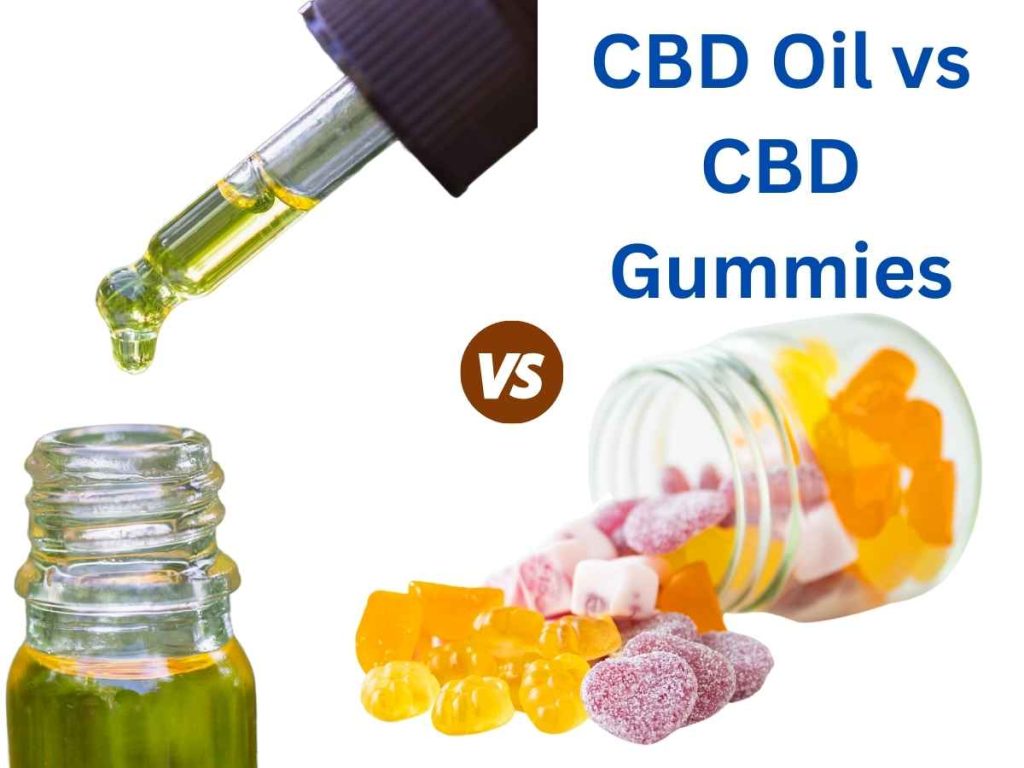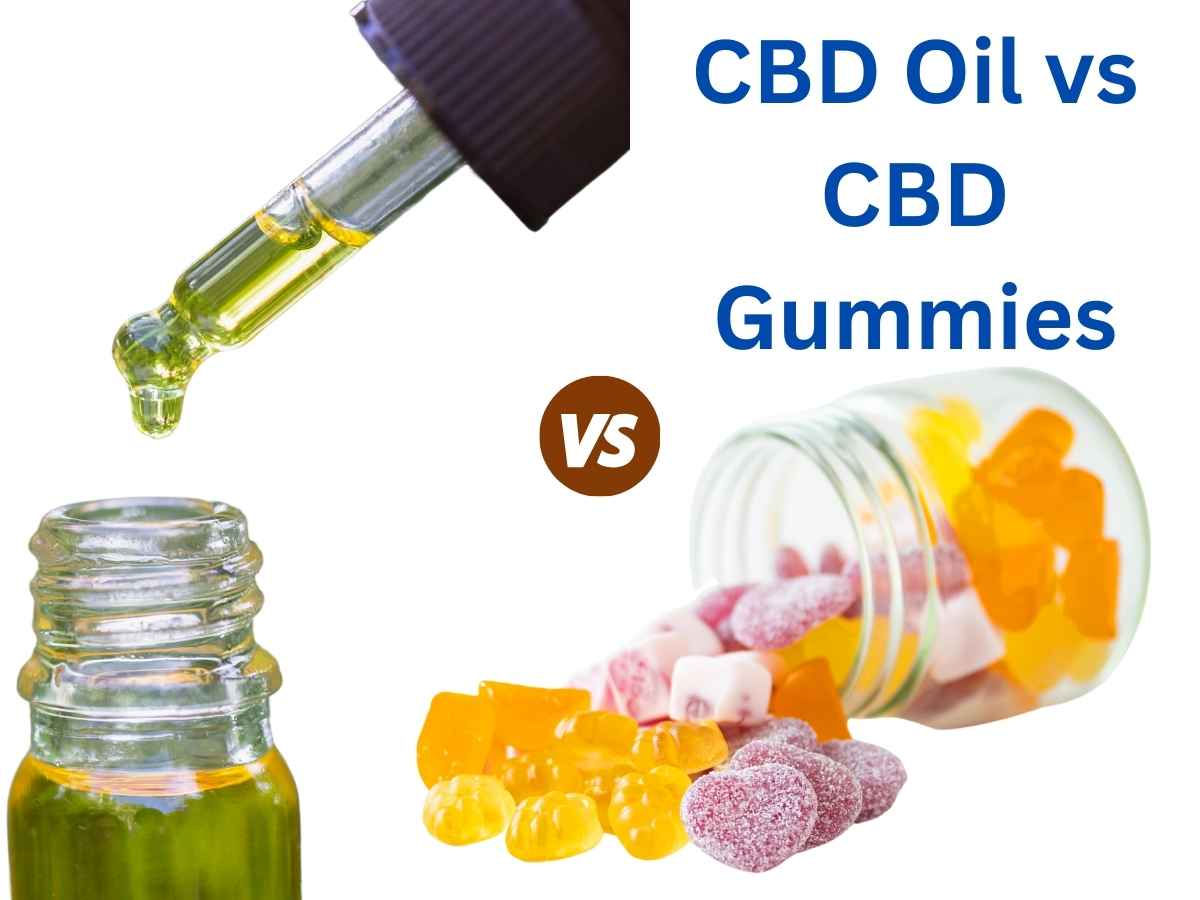As the popularity of CBD continues to soar, consumers are faced with an ever-expanding array of product choices. Two of the most popular options are CBD oil and CBD gummies. Both offer unique benefits and potential drawbacks, making the decision between them a matter of personal preference and individual needs. In this in-depth guide, we’ll explore the key differences between CBD oil and CBD gummies, helping you make an informed choice about which product might be right for you.
Table of Contents
Understanding CBD: A Brief Overview
Before diving into the specifics of CBD oil and gummies, it’s important to understand what CBD is and how it works. CBD, short for cannabidiol, is one of over 100 cannabinoids found in the cannabis plant. Unlike its more famous cousin THC (tetrahydrocannabinol), CBD does not produce psychoactive effects or a “high.”

CBD interacts with the body’s endocannabinoid system (ECS), a complex network of receptors and neurotransmitters that helps regulate various physiological processes, including mood, sleep, appetite, and pain sensation. By influencing the ECS, CBD may offer a range of potential health benefits, from reducing anxiety and inflammation to improving sleep quality and managing chronic pain.
CBD Oil: The Classic Choice
CBD oil, also known as CBD tincture, is one of the most versatile and popular CBD products on the market. It typically consists of CBD extract mixed with a carrier oil, such as MCT oil or hemp seed oil.
Advantages of CBD Oil:
- Fast-acting: When taken sublingually (under the tongue), CBD oil can be absorbed quickly into the bloodstream, potentially providing faster relief compared to other methods of consumption.
- Precise dosing: Most CBD oils come with a dropper, allowing for easy and accurate dosing.
- High bioavailability: Sublingual administration bypasses the digestive system, resulting in higher bioavailability compared to oral consumption.
- Versatility: CBD oil can be added to food and beverages or applied topically for localized relief.
- Full-spectrum options: Many CBD oils are available in full-spectrum formulations, which contain a range of beneficial cannabinoids and terpenes that may enhance the overall effects through the entourage effect.
Disadvantages of CBD Oil:
- Taste: Some users find the natural, earthy taste of CBD oil unpleasant.
- Portability: Carrying a bottle of liquid CBD oil may not be as convenient as other forms, especially when traveling.
- Potential mess: Droppers can sometimes leak, leading to waste or stains.
CBD Gummies: A Tasty Alternative
CBD gummies are edible candies infused with CBD. They come in various flavors, shapes, and concentrations, offering a more palatable and discreet way to consume CBD.
Advantages of CBD Gummies:
- Taste and enjoyment: Gummies mask the earthy taste of CBD with fruity flavors, making them more enjoyable for many users.
- Convenience and discretion: Gummies are easy to carry and consume on-the-go without drawing attention.
- Pre-measured doses: Each gummy contains a specific amount of CBD, eliminating the need for measuring.
- Long-lasting effects: As gummies are digested, they may provide longer-lasting effects compared to sublingual CBD oil.
- Appealing to new users: The familiar form and taste of gummies can make CBD less intimidating for first-time users.
Disadvantages of CBD Gummies:
- Slower onset: Since gummies must be digested, the effects may take longer to kick in compared to sublingual CBD oil.
- Lower bioavailability: The digestive process can reduce the amount of CBD that actually enters the bloodstream.
- Added ingredients: Some gummies contain added sugars or artificial flavors, which may not be desirable for all consumers.
- Potential interaction with medications: As with any oral supplement, CBD gummies may interact with certain medications that are processed by the liver.
Comparing Effectiveness and Bioavailability
One of the key factors to consider when choosing between CBD oil and gummies is bioavailability – the proportion of CBD that actually enters the bloodstream and produces an effect.
A study published in the journal Pharmaceuticals found that sublingual administration of CBD oil resulted in higher bioavailability compared to oral consumption. The researchers reported that sublingual CBD had a bioavailability of around 13-19%, while oral consumption had a bioavailability of only 6% [1].
This difference in bioavailability means that you may need to consume a higher dose of CBD gummies to achieve the same effects as a lower dose of CBD oil. However, it’s important to note that individual responses to CBD can vary, and some users may find gummies more effective for their needs despite the lower bioavailability.
Dosage Considerations
Determining the right dosage of CBD can be challenging, as it depends on various factors such as body weight, individual body chemistry, and the specific condition being addressed. However, the method of consumption can impact dosage recommendations.
For CBD oil:
- Start with a low dose, such as 5-10mg, taken sublingually.
- Hold the oil under your tongue for 60-90 seconds before swallowing to maximize absorption.
- Gradually increase the dose every few days until you achieve the desired effects.
For CBD gummies:
- Begin with one gummy, regardless of its CBD content.
- Wait at least 2 hours to assess the effects before considering an additional dose.
- Due to lower bioavailability, you may need a higher total CBD content in gummies compared to oil to achieve similar effects.
Always consult with a healthcare professional before starting any new supplement regimen, especially if you’re taking medications or have underlying health conditions.
Potential Health Benefits
Both CBD oil and gummies may offer similar potential health benefits, although the onset and duration of effects may differ. Some of the most researched potential benefits of CBD include:
- Anxiety reduction: A 2019 study published in the Journal of Clinical Medicine found that CBD may have anxiolytic effects, potentially helping to reduce symptoms of anxiety disorders [2].
- Pain management: Research suggests that CBD may have analgesic properties, making it a potential option for managing chronic pain conditions [3].
- Improved sleep: CBD has shown promise in improving sleep quality and duration, particularly in individuals with anxiety or pain that interferes with sleep [4].
- Neuroprotection: Preliminary studies indicate that CBD may have neuroprotective properties, potentially benefiting individuals with neurodegenerative disorders [5].
- Anti-inflammatory effects: CBD has demonstrated anti-inflammatory properties in various studies, which may be beneficial for conditions characterized by inflammation [6].
It’s important to note that while these potential benefits are promising, more research is needed to fully understand the effects of CBD on human health. Always consult with a healthcare professional before using CBD for any medical condition.
Legal Considerations
The legal status of CBD products can be complex and varies by location. In the United States, CBD derived from hemp (cannabis plants containing less than 0.3% THC) was federally legalized under the 2018 Farm Bill. However, individual states may have their own regulations regarding CBD products.
When choosing between CBD oil and gummies, consider the following legal aspects:
- THC content: Ensure that the product contains less than 0.3% THC to comply with federal law.
- State regulations: Check your state’s specific laws regarding CBD products, as some states have more restrictive regulations.
- Drug testing: While CBD itself typically doesn’t show up on drug tests, full-spectrum products may contain trace amounts of THC that could potentially result in a positive test.
- Quality assurance: Look for products that have been third-party tested and provide certificates of analysis to ensure legal compliance and product safety.
For more information on the legal status of CBD in your area, visit the FDA’s website on CBD regulation: https://www.fda.gov/news-events/public-health-focus/fda-regulation-cannabis-and-cannabis-derived-products-including-cannabidiol-cbd
Making Your Choice: Factors to Consider
When deciding between CBD oil and gummies, consider the following factors:
- Desired onset time: If you need quick relief, CBD oil may be the better choice due to its faster absorption when taken sublingually.
- Duration of effects: For longer-lasting effects, gummies may be preferable as they are metabolized more slowly.
- Taste preference: If you dislike the taste of CBD oil, flavored gummies might be a more enjoyable option.
- Dosage precision: CBD oil allows for more precise dosing, while gummies offer pre-measured doses that may be more convenient for some users.
- Lifestyle and convenience: Consider which format fits better into your daily routine and lifestyle.
- Dietary restrictions: Check the ingredients in gummies if you have any dietary restrictions or are avoiding added sugars.
- Budget: Compare the cost per mg of CBD between oils and gummies to determine which offers better value for your needs.
Ultimately, the choice between CBD oil and gummies comes down to personal preference and individual needs. Some users may even choose to incorporate both products into their wellness routine, using oil for fast-acting relief and gummies for sustained effects throughout the day.
Safety and Side Effects
Both CBD oil and gummies are generally considered safe for most users when consumed in appropriate doses. However, as with any supplement, there are potential side effects to be aware of:
- Dry mouth
- Drowsiness or fatigue
- Changes in appetite
- Diarrhea
- Interactions with certain medications
To minimize the risk of side effects:
- Start with a low dose and gradually increase as needed.
- Choose high-quality products from reputable manufacturers.
- Consult with a healthcare professional before using CBD, especially if you have underlying health conditions or are taking medications.
- Be cautious when combining CBD with other substances, including alcohol and caffeine.
For more information on CBD safety and potential side effects, refer to the World Health Organization’s critical review report on CBD: https://www.who.int/medicines/access/controlled-substances/CannabidiolCriticalReview.pdf
Conclusion
Both CBD oil and CBD gummies offer unique advantages and potential drawbacks. CBD oil may be preferable for those seeking fast-acting relief and precise dosing, while gummies offer a more enjoyable and convenient option for many users. By considering factors such as onset time, taste preference, lifestyle, and individual health goals, you can make an informed decision about which CBD product is right for you.
Remember to choose high-quality products from reputable manufacturers, start with a low dose, and consult with a healthcare professional before incorporating CBD into your wellness routine. With the right approach, both CBD oil and gummies can be valuable tools in supporting overall health and well-being.
FAQs
Can I take CBD oil and gummies together?
Yes, you can use both CBD oil and gummies as part of your wellness routine. However, be mindful of your total daily CBD intake and consult with a healthcare professional to ensure you’re not exceeding recommended doses.
Will CBD oil or gummies make me feel high?
No, neither CBD oil nor gummies should make you feel high. CBD is non-psychoactive, meaning it doesn’t produce the intoxicating effects associated with THC.
How long do the effects of CBD oil and gummies last?
The duration of effects can vary depending on factors such as dosage, metabolism, and individual body chemistry. Generally, the effects of CBD oil may last 2-6 hours, while gummies may provide effects for 4-8 hours due to slower digestion.
Can I drive after taking CBD oil or gummies?
While CBD doesn’t typically cause impairment, it’s best to understand how your body reacts to CBD before operating a vehicle. Some people may experience drowsiness, especially at higher doses.
Are there any drug interactions I should be aware of with CBD?
CBD can interact with certain medications, particularly those metabolized by the liver’s cytochrome P450 enzyme system. Always consult with a healthcare professional before using CBD if you’re taking any medications.
How should I store CBD oil and gummies?
Store both products in a cool, dry place away from direct sunlight. CBD oil may last longer when refrigerated, while gummies should be kept at room temperature unless otherwise specified by the manufacturer.
Can I give CBD oil or gummies to my pets?
While CBD is sometimes used for pets, it’s crucial to use products specifically formulated for animals and to consult with a veterinarian before giving CBD to your pet.
Are there any age restrictions for using CBD products?
Age restrictions for CBD products can vary by location and product type. In general, it’s recommended that CBD be used by adults 18 and older, unless under the guidance of a healthcare professional.
How do I know if I’m buying a quality CBD product?
Look for products from reputable manufacturers that provide third-party lab testing results, also known as Certificates of Analysis (COAs). These should verify the CBD content and confirm the absence of contaminants.
Can I travel with CBD oil or gummies?
While hemp-derived CBD is federally legal in the US, regulations can vary by state and country. Always research local laws before traveling with CBD products, and consider gummies for easier transportation through airport security.
References
[1] Millar, S. A., Stone, N. L., Yates, A. S., & O’Sullivan, S. E. (2018). A Systematic Review on the Pharmacokinetics of Cannabidiol in Humans. Frontiers in Pharmacology, 9, 1365.
https://www.ncbi.nlm.nih.gov/pmc/articles/PMC6275223/
[2] Skelley, J. W., Deas, C. M., Curren, Z., & Ennis, J. (2020). Use of cannabidiol in anxiety and anxiety-related disorders. Journal of the American Pharmacists Association, 60(1), 253-261.
https://www.japha.org/article/S1544-3191(19)30514-X/fulltext
[3] Vučković, S., Srebro, D., Vujović, K. S., Vučetić, Č., & Prostran, M. (2018). Cannabinoids and Pain: New Insights From Old Molecules. Frontiers in Pharmacology, 9, 1259.
https://www.ncbi.nlm.nih.gov/pmc/articles/PMC6277878/
[4] Shannon, S., Lewis, N., Lee, H., & Hughes, S. (2019). Cannabidiol in Anxiety and Sleep: A Large Case Series. The Permanente Journal, 23, 18-041.
https://www.ncbi.nlm.nih.gov/pmc/articles/PMC6326553/
[5] Peres, F. F., Lima, A. C., Hallak, J. E., Crippa, J. A., Silva, R. H., & Abílio, V. C. (2018). Cannabidiol as a Promising Strategy to Treat and Prevent Movement Disorders? Frontiers in Pharmacology, 9, 482.
https://www.ncbi.nlm.nih.gov/pmc/articles/PMC5958190/
[6] Atalay, S., Jarocka-Karpowicz, I., & Skrzydlewska, E. (2019). Antioxidative and Anti-Inflammatory Properties of Cannabidiol. Antioxidants (Basel), 9(1), 21.
https://www.ncbi.nlm.nih.gov/pmc/articles/PMC7023045/

